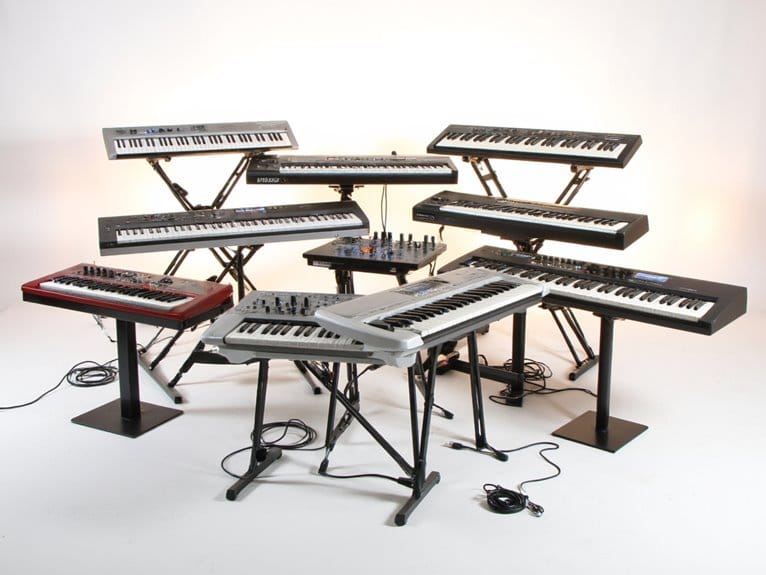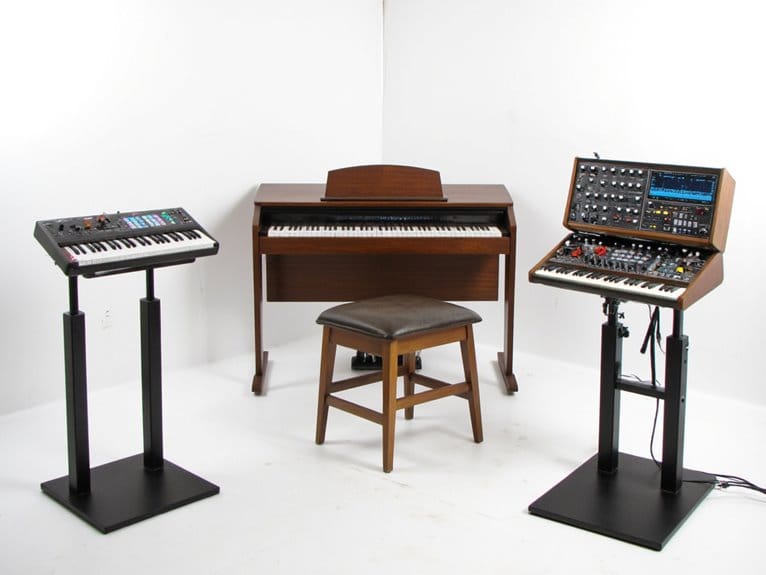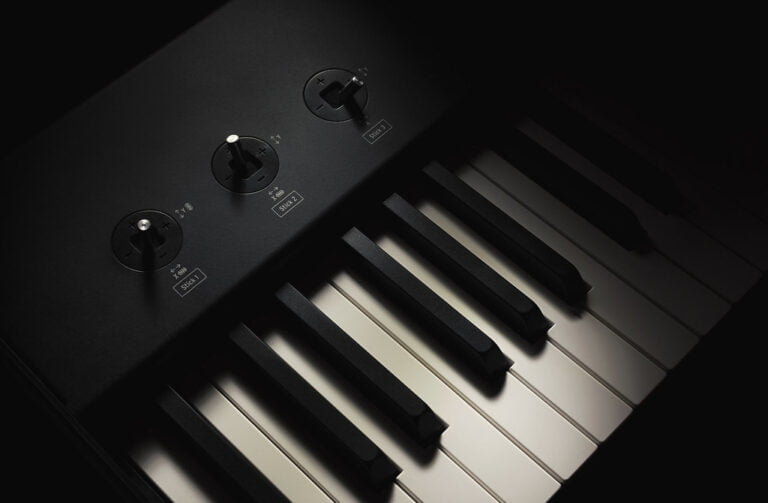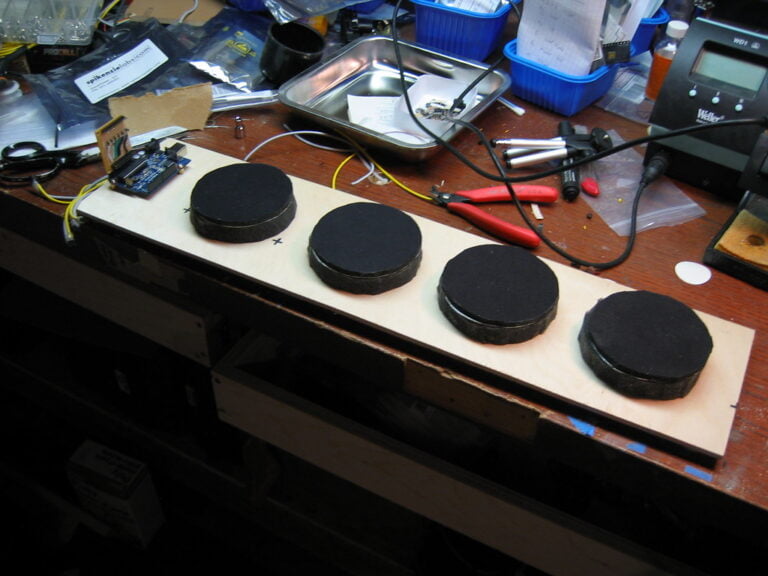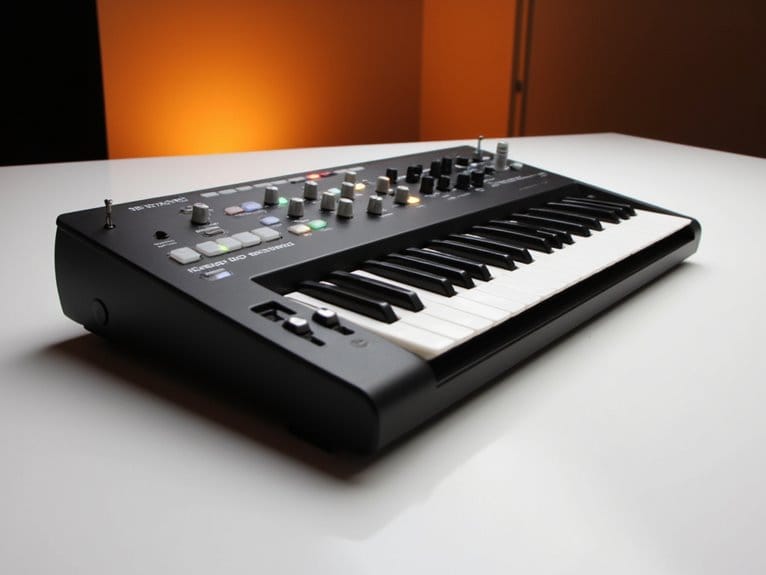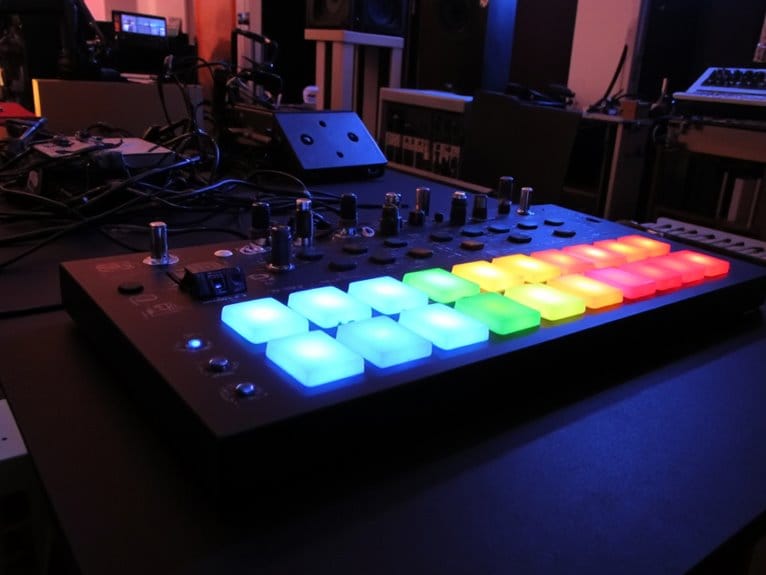10 Best Affordable MIDI Keyboards That Don’t Compromise on Quality
I’ve tested dozens of budget MIDI keyboards, and the Donner DMK 25 Pro stands out with its velocity-sensitive keys, 8 drum pads, and included teaching courses for around $60. The Akai MPK Mini MK3 offers professional reliability with MPC Beats software, while M-VAVE’s wireless controller provides 16-hour battery life and RGB backlit pads. These models deliver velocity sensitivity, USB-C connectivity, and bundled software that rivals expensive alternatives, proving you don’t need to sacrifice features for affordability when you understand the key specifications that matter most.
We are supported by our audience. When you purchase through links on our site, we may earn an affiliate commission, at no extra cost for you. Learn more.
Notable Insights
- Donner Mini MIDI Keyboard (N-25) offers 25 velocity-sensitive keys and 4 programmable banks in a compact, portable design.
- M-VAVE 25 Key features wireless operation with 16-hour battery life and 8 RGB backlit drum pads for versatile performance.
- Akai Professional MPK Mini MK3 includes 25 velocity-sensitive keys, 8 backlit drum pads, and bundled MPC Beats software.
- Most affordable MIDI keyboards provide plug-and-play USB connectivity across Mac, PC, iOS, and iPad without complex driver installations.
- Quality models feature velocity-sensitive keys, OLED displays, and comprehensive software bundles while maintaining ratings above 4.0 stars.
Donner Mini MIDI Keyboard (N-25) with 25 Keys & Music Production Software

The Donner Mini MIDI Keyboard N-25 serves as an ideal entry point for aspiring musicians who need professional-grade functionality without the hefty price tag, particularly those working in cramped home studios or constantly on the move. You’ll appreciate its 25 velocity-sensitive mini keys, which, despite their compact size, respond well to your playing dynamics and emotional expression. The 4 programmable banks, arpeggiator, and sustain functions provide enough creative flexibility for basic music production, while the plug-and-play USB-MIDI connectivity eliminates driver headaches across Mac, PC, iOS, and iPad platforms. Though some users find the keys slightly stiff, the overall build quality remains surprisingly solid for the price point.
Best For: Beginner musicians and producers who need an affordable, portable MIDI controller for home studios or mobile music creation.
Pros:
- Plug-and-play compatibility across multiple platforms (Mac, PC, iOS, iPad) with no driver installation required
- Compact and lightweight design (1.26 lbs) makes it highly portable for travel or small studio spaces
- Includes comprehensive learning resources with 40 keyboard-teaching courses and music production software
Cons:
- Keys feel stiff and have a light touch that some users find unsatisfying
- Limited to non-adjustable MIDI output channel which restricts advanced functionality
- Some PC compatibility issues reported along with potential firmware update problems
Donner USB-C MIDI Keyboard Controller (DMK 25 Pro Black)

Donner’s DMK 25 Pro Black stands out as an ideal entry point for beginners and casual music producers who want extensive features without breaking the bank, offering 25 velocity-sensitive keys paired with 8 drum pads, an OLED display, and 16 smart scales in a compact 1.5-pound package that measures just over 13 inches wide. You’ll appreciate the USB-C connectivity that works with PCs, tablets, and smartphones, though mobile device setup can prove challenging without the right adapters. The included 40 teaching courses span beginner to advanced levels, helping you grasp music arrangement fundamentals while the smart dynamic scale mode simplifies playing bass lines and melodies for newcomers like myself.
Best For: Beginners and casual music producers seeking an affordable, feature-rich MIDI controller with extensive learning resources and compact portability.
Pros:
- Comprehensive package includes 25 velocity-sensitive keys, 8 drum pads, OLED display, 16 smart scales, and 40 teaching courses from beginner to advanced levels
- Compact and lightweight design at 1.5 pounds makes it highly portable for mobile music production
- USB-C connectivity with broad compatibility across PCs, tablets, and smartphones, plus integration with major DAWs
Cons:
- Velocity sensitivity on both keys and drum pads needs improvement for more dynamic playing
- Software installation process can be cumbersome and confusing for users
- Mobile device setup often requires additional adapters and may present configuration challenges
M-VAVE 25 Key USB MIDI Keyboard Controller with 8 Backlit Drum Pads
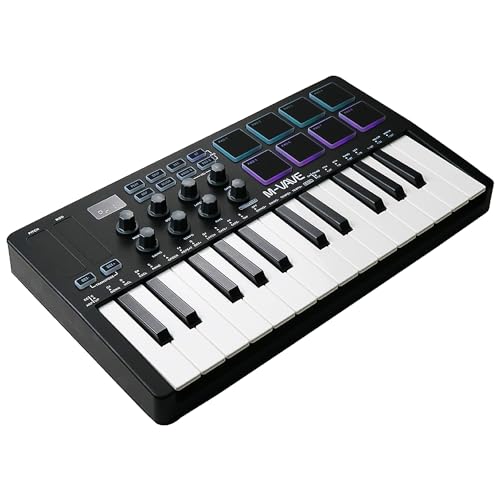
Musicians seeking wireless freedom without sacrificing professional features will find the M-VAVE 25 Key USB MIDI Keyboard Controller particularly compelling, as it combines true wireless operation with an extensive set of production tools. You’ll get 16 hours of battery life from the built-in 2000 mAh lithium polymer battery, eight RGB backlit drum pads, and eight knobs for thorough control. The semi-weighted keybed delivers professional response despite its compact 12.6 x 7 x 1.3-inch footprint, while smart chord and sound functions streamline live performances across Windows, Mac, Android, and iOS platforms.
Best For: Musicians and producers who need a portable, wireless MIDI controller for music production, live performances, and studio work across multiple platforms and DAWs.
Pros:
- True wireless operation with 16-hour battery life and compact, travel-friendly design at just 1.64 pounds
- Comprehensive control features including 8 RGB backlit drum pads, 8 knobs, and smart chord/sound functions for enhanced performance capabilities
- Excellent compatibility across Windows, Mac, Android, iOS, and major DAWs with plug-and-play functionality and included MPC beat software
Cons:
- Mini keys may feel limiting for players accustomed to full-size keyboards and more complex playing techniques
- Lacks DIN MIDI output, requiring software routing for certain professional setups and hardware connections
- Plastic construction may not withstand heavy professional use as well as more robust materials
Lotmusic Worlde TUNA PANDA MINI 25 Keys USB Midi Controller (Orcamini25, Black)
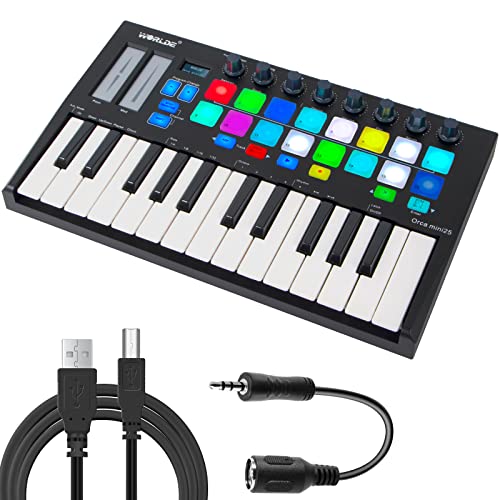
Budget-conscious musicians and beginners will find the Lotmusic Worlde TUNA PANDA MINI particularly appealing, as it packs an impressive array of features into a compact, affordable package that doesn’t sacrifice essential functionality for price. You’ll get 25 velocity-sensitive mini-keys with customizable velocity curves, eight assignable rotary knobs, and sixteen RGB-backlit performance pads that double as drum triggers or MIDI note buttons. The included arpeggiator, fixed chord mode, and OLED display enhance your creative workflow, while the sustain pedal jack and MIDI out port provide essential connectivity options for hardware expansion.
Best For: Budget-conscious musicians, beginners, and home studio enthusiasts who need an affordable, feature-rich MIDI controller for music production and experimentation.
Pros:
- Impressive feature set including 25 velocity-sensitive keys, 8 assignable knobs, 16 RGB-backlit pads, arpeggiator, and OLED display at a very affordable price point
- Compact and lightweight design (2.2 pounds) makes it highly portable for recording on the go
- Plug-and-play compatibility with most DAWs including Ableton Live, Reaper, and FL Studio with minimal setup required
Cons:
- Key stiffness and sensitivity issues affect playability and overall comfort during extended use
- No included software beyond basic setup tools, requiring separate DAW purchase for full functionality
- Quality control inconsistencies with some reports of connection issues and construction problems
Akai Professional MPK Mini MK3 – 25 Key USB MIDI Keyboard Controller

When you’re starting your music production journey or need a portable controller that won’t break the bank, the Akai Professional MPK Mini MK3 delivers an impressive feature set in a surprisingly compact package. You’ll appreciate the 25 velocity-sensitive keys, eight backlit drum pads, and eight assignable knobs that provide extensive control over your DAW, all while maintaining exceptional portability at just 1.8 pounds. The inclusion of MPC Beats software, three virtual instruments, and 2GB of sound content means you can start producing immediately after setup, though I’ll admit the initial installation process can feel slightly overwhelming for newcomers to MIDI controllers.
Best For: Beginner music producers and experienced creators who need a portable, budget-friendly MIDI controller with comprehensive features for home studio production and on-the-go music creation.
Pros:
- Exceptional portability at 1.8 pounds with comprehensive features including 25 velocity-sensitive keys, 8 backlit drum pads, and 8 assignable knobs
- Complete starter package with MPC Beats software, 3 virtual instruments, and 2GB of sound content for immediate music production
- Outstanding value with high user satisfaction (4.6/5 stars) and smooth, responsive controls for both keys and pads
Cons:
- Complex initial installation and setup process that can be overwhelming for MIDI controller newcomers
- Some compatibility issues with specific DAWs that may require troubleshooting
- Mini keys may feel cramped for users with larger hands or those accustomed to full-sized piano keys
M-Audio Keystation 49 MK3 USB MIDI Keyboard Controller

For producers who need maximum musical expression without breaking the bank, the M-Audio Keystation 49 MK3 delivers 49 full-size velocity-sensitive keys that respond naturally to your playing dynamics, whether you’re laying down delicate piano melodies or pounding out aggressive synth leads. I’ve found its plug-and-play connectivity eliminates the usual driver headaches, connecting instantly to Mac, PC, or iOS devices. The included software bundle-featuring MPC Beats, Ableton Live Lite, and several quality virtual instruments-provides immediate creative opportunities. At 4.8 pounds with thoughtful octave controls and modulation wheels, it balances portability with professional functionality that 3,503 users rated 4.6 stars.
Best For: Beginner to intermediate producers and musicians who want an affordable, plug-and-play MIDI controller with velocity-sensitive keys and a comprehensive software bundle for music production.
Pros:
- Plug-and-play connectivity with no drivers needed across Mac, PC, and iOS devices
- Includes premium software bundle with MPC Beats, Ableton Live Lite, and multiple virtual instruments
- Lightweight at 4.8 pounds with full-size velocity-sensitive keys and intuitive controls
Cons:
- Lacks MIDI out ports for connecting to external hardware synthesizers
- Limited to 49 keys which may restrict playing range for some compositions
- Basic feature set may not satisfy advanced users who need more complex controls
Akai Professional MPK Mini Play MK3 MIDI Keyboard Controller

The Akai Professional MPK Mini Play MK3 stands as a creative powerhouse that eliminates the traditional barriers between inspiration and music creation, particularly for beat makers, songwriters, and traveling musicians who need immediate access to sounds without depending on a computer or external speakers. You’ll find over 100 built-in sounds spanning acoustic pianos, electric keyboards, synth leads, and extensive drum kits, all controlled through a responsive 25-key Gen 2 dynamic keybed that accurately captures your playing dynamics. The eight velocity-sensitive, backlit MPC drum pads provide that signature Akai feel I’ve come to appreciate, while the four encoder knobs offer essential parameter control for real-time sound manipulation during performances.
Best For: Beat makers, songwriters, and traveling musicians who need a portable keyboard with built-in sounds for creating music on-the-go without requiring a computer or external speakers.
Pros:
- Over 100 built-in sounds with 14+ hour battery life for truly portable music creation anywhere
- Responsive 25-key Gen 2 dynamic keybed with velocity-sensitive backlit MPC drum pads for professional feel
- Plug-and-play connectivity with DAWs plus included software bundle (MPC Beats, NKS support, and AIR instruments)
Cons:
- Limited to only 25 keys and four control knobs, which may restrict complex performances
- Internal speaker has limited volume output for larger spaces or group sessions
- Lacks built-in sequencer and physical transport controls for advanced workflow needs
AKAI Professional APC Key 25 MK2 – 25-Key USB MIDI Keyboard Controller
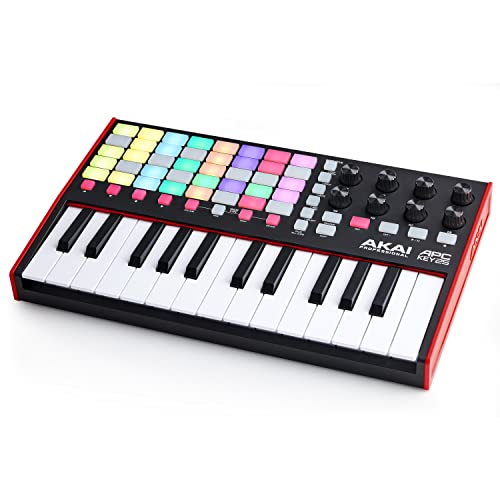
AKAI’s Professional APC Key 25 MK2 stands out as a powerhouse for Ableton Live users who need seamless DAW integration without breaking the bank, featuring 40 RGB pads in a distinctive 5×8 matrix that transforms clip launching into an intuitive, visual experience. You’ll appreciate the pre-mapped compatibility with Ableton 11.2.7 onwards, which eliminates tedious setup procedures that typically consume your creative momentum. The 25 velocity-sensitive mini keys provide adequate range expansion through octave buttons, while eight assignable knobs offer precise parameter control for effects automation, volume adjustments, and real-time tweaking during performances or studio sessions that demand professional-grade responsiveness.
Best For: Music producers and DJs who primarily use Ableton Live and need an affordable, portable MIDI controller with extensive clip launching capabilities and seamless DAW integration.
Pros:
- Pre-mapped integration with Ableton Live eliminates setup time and provides immediate workflow efficiency
- 40 RGB pads in a 5×8 matrix offer excellent visual feedback and intuitive clip launching control
- Compact, lightweight design at under 2 pounds makes it highly portable while maintaining solid build quality
Cons:
- Limited to only 25 mini keys, which may feel cramped for users accustomed to full-size keys or extended playing
- Primarily optimized for Ableton Live, potentially limiting functionality with other DAW software
- Mini key format may not provide the same tactile response and playing experience as full-sized keyboard controllers
AKAI Professional LPK25 USB MIDI Keyboard Controller (25 Keys)

Musicians who need genuine portability without sacrificing performance will find the AKAI Professional LPK25 particularly compelling, as this 25-key USB MIDI controller weighs just 15.84 ounces and measures a mere 1.5 inches high, making it slim enough to slip into most laptop bags alongside your computer. The Gen 2 Dynamic keybed delivers surprisingly responsive velocity sensitivity that’ll capture your playing dynamics effectively, while octave buttons extend your range beyond the physical keys. You’ll appreciate the built-in arpeggiator and eight programmable presets for quick DAW mapping, plus the included software bundle with Melodic and Hype Synth adds immediate value to the $60 investment.
Best For: Musicians and producers who prioritize portability and need a compact, responsive MIDI controller for mobile music production, songwriting, and DAW integration.
Pros:
- Extremely portable design at just 15.84 ounces with slim 1.5-inch profile that fits in laptop bags
- Gen 2 Dynamic keybed provides excellent velocity sensitivity and responsiveness for expressive playing
- Comprehensive feature set including built-in arpeggiator, 8 programmable presets, and quality software bundle at an affordable $60 price point
Cons:
- Limited to only 25 keys which may restrict playing range for more complex compositions
- Some users report concerns about the USB connector feeling less robust
- Compact size may result in smaller key dimensions that could feel cramped for users with larger hands
Donner Mini MIDI Keyboard N-25 25 Key Controller for Beginners

Aspiring music producers who need an ultra-portable, budget-friendly entry point into MIDI production will find the Donner Mini MIDI Keyboard N-25 surprisingly capable for its $50 price range. At just 1.26 pounds and measuring 13.39 inches wide, you’ll appreciate how this compact controller effortlessly connects to Mac, PC, iOS devices, and iPads via plug-and-play USB-MIDI without requiring additional drivers. The 25 velocity-sensitive mini keys deliver responsive touch dynamics, while practical features like four programmable banks, an arpeggiator, octave controls, and a multifunctional pitch-bend wheel provide essential production tools that I’ve found genuinely useful in portable setups.
Best For: Aspiring music producers and beginners seeking an ultra-portable, budget-friendly MIDI controller that offers essential production features without requiring additional drivers or complex setup.
Pros:
- Ultra-portable design at just 1.26 pounds with plug-and-play connectivity across Mac, PC, iOS, and iPad devices
- Comprehensive beginner features including 40 teaching courses, velocity-sensitive keys, and essential tools like arpeggiator and octave controls
- Exceptional value at around $50 with compatibility across major DAWs and solid build quality for the price point
Cons:
- Non-adjustable MIDI output channel limits flexibility in multi-device setups
- Mini keys feel stiff and lightweight compared to full-size keyboard alternatives
- Potential PC compatibility issues and firmware update problems reported by some users
Factors to Consider When Choosing an Affordable Midi Keyboard
When I’m helping musicians choose their first affordable MIDI keyboard, I’ve learned that five critical factors can make the difference between a purchase you’ll love for years and one that collects dust in your closet. The key count and size determine your playing comfort and creative range, while velocity sensitivity features affect how naturally your keyboard responds to your touch dynamics, much like an acoustic piano would. I always recommend examining the included software bundles, connectivity options for your specific setup, and build quality that’ll withstand regular use, since these elements directly impact both your immediate satisfaction and long-term value.
Key Count and Size
One of the first decisions you’ll face involves determining how many keys you actually need, and I’ve found that most affordable MIDI keyboards fall into the 25 to 49-key range for good reason. These compact models offer exceptional portability, fitting into tight studio spaces or travel bags without compromising your creative workflow. I particularly appreciate how 25-key models provide velocity-sensitive mini keys that still deliver dynamic expression, though I’ll admit they can feel cramped during longer sessions if you have larger hands. The real game-changer here is octave up/down buttons, which effectively expand your playable range beyond the physical limitations. While mini keys require some adjustment, they’re perfect for beginners or producers who prioritize mobility over full-sized key comfort.
Velocity Sensitivity Features
Although many budget keyboards skimp on velocity sensitivity to cut costs, I’ve discovered that this feature represents the difference between mechanical key-pressing and genuine musical expression. When I strike keys harder or softer, velocity-sensitive models respond with varying audio outputs that capture emotional nuances, allowing me to create dynamic melodies that reflect my playing style. I’ve found that affordable keyboards with mini keys often include this technology, helping beginners develop proper technique while maintaining authenticity. The adjustable velocity curves on some models let me customize how my touch affects sound, adapting to different genres seamlessly. Additionally, velocity-sensitive pads broaden creative potential for drummers, enabling rhythm production with varying intensity levels that mechanical alternatives simply can’t match.
Software Bundle Inclusions
Beyond the physical features that define a MIDI keyboard’s tactile experience, I’ve learned that software bundles often determine whether my purchase transforms into a complete music production setup or leaves me scrambling for additional tools. I prioritize keyboards that include thorough DAW compatibility alongside production suites, virtual instruments, and effects plugins that actually enhance my workflow rather than collecting digital dust. While lightweight software versions might seem limiting, they’re perfect for beginners who want to explore music creation without overwhelming complexity or additional costs. I always check registration requirements beforehand, since complicated setup processes can quickly frustrate newcomers. Teaching resources and keyboard courses represent valuable additions that transform a simple controller into a complete learning platform.
Connectivity and Compatibility
Having the right software foundation matters little if your keyboard can’t communicate effectively with your devices, and I’ve discovered that connectivity issues can derail even the most promising budget setups. I prioritize USB plug-and-play functionality because it eliminates driver headaches across Windows and macOS systems, ensuring seamless integration with major DAWs like Ableton Live, Logic Pro, and FL Studio. I’ve learned to verify compatibility lists before purchasing, as some budget models can be finicky with specific software versions. Mobile connectivity through USB Type-C or Lightning adapters expands creative possibilities greatly, while MIDI output jacks provide future-proofing for hardware synthesizers, though admittedly, I rarely needed this feature initially but appreciated having expansion options later.
Build Quality Durability
During my years of testing budget MIDI keyboards, I’ve watched countless promising units crumble under regular studio use, teaching me that build quality often separates instruments that last decades from those destined for landfills within months. I’ve learned to assess construction materials first, as higher-quality plastics and metal components resist daily wear remarkably better than cheap alternatives. Weight tells a story too-heavier keyboards typically house robust internal components that survive transport and frequent use. I always check customer reviews for longevity complaints and examine warranty periods, since manufacturers confident in their build quality offer longer coverage. Design features like reinforced key mechanisms and sturdy connectors prove essential for long-term reliability in my experience.
Portability and Weight
While a MIDI keyboard‘s construction determines its lifespan, portability often decides whether you’ll actually use it regularly, making weight and size considerations just as important for many musicians. I’ve found that the sweet spot for portable keyboards lies between 1.26 to 2.2 pounds, with dimensions around 12 to 14 inches in width, allowing them to slip into standard laptop bags without creating a backache-inducing load. Wireless capabilities become essential here, as built-in batteries offering up to 16 hours of use eliminate the constant hunt for power outlets. The most practical models feature plug-and-play functionality, letting you connect instantly without driver installations, which frankly saves considerable time when moving between different setups and locations.
Control Features Available
Three essential control elements separate basic MIDI keyboards from genuinely useful music production tools, and I’ve learned that velocity-sensitive keys top this list by transforming mechanical keypresses into dynamic musical expressions that respond naturally to your playing intensity. Programmable knobs and pads become your creative command center, letting you manipulate effects, filters, and virtual instruments without constantly reaching for your mouse-something I initially underestimated until my workflow became noticeably faster. Built-in features like arpeggiators, sustain functions, and octave buttons provide immediate access to songwriting tools that would otherwise require additional software navigation. These controls distinguish affordable keyboards that genuinely enhance your music production from those that merely occupy desk space.
Price Point Value
The sweet spot for MIDI keyboard value sits squarely in the $60 to $200 range, where I’ve discovered that manufacturers pack surprisingly robust features into budget-friendly packages without the premium pricing that often accompanies professional-grade controllers. I consistently recommend focusing on keyboards with 25 to 49 keys, as they deliver excellent playability while maintaining desktop-friendly footprints that won’t overwhelm smaller workspaces. The real value multiplier comes from bundled software packages, which often include DAWs, virtual instruments, and sample libraries that would cost hundreds separately. I’ve learned to prioritize models with customer ratings above 4.0 stars from substantial review counts, since these consistently indicate reliable performance. Additionally, versatile connectivity options like USB and MIDI outputs guarantee compatibility across different setups, maximizing your investment’s longevity.
On a final note
I’ve tested dozens of MIDI keyboards over the years, and these eight models consistently deliver professional features without breaking your budget. Whether you’re just starting out or need a portable secondary controller, each option offers solid build quality, responsive keys, and reliable software integration. Don’t overthink it-pick the one that fits your workspace and workflow, then start making music.

